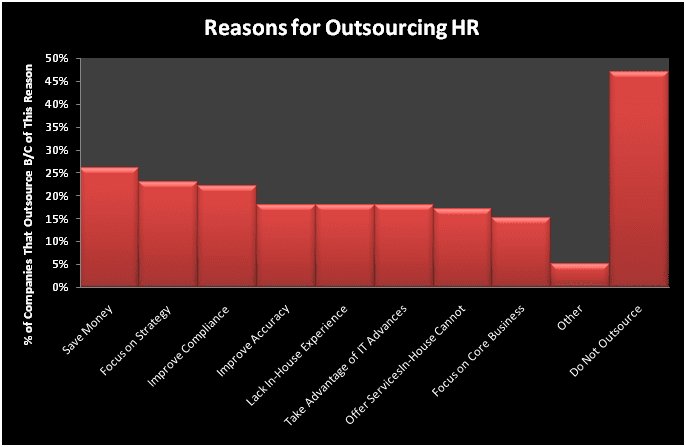The days of high fixed cost internal recruiting process can now be put to an end. In this volatile economic environment, executives have found an alternative to make the most out of their hiring expenses. One compelling alternative is by partnering with an RPO provider.
Experienced RPO providers can provide wide-ranging support while still allowing for scalable, flexible and more cost-effective solutions for your hiring needs. However, the decision to engage with an RPO provider is not to be taken lightly.
The key to successful hiring with the help of an RPO provider is to make careful planning and have a crystal-clear understanding of your staffing firm’s hiring needs even before the engagement has been made. Once you have a full grasp of this, the stage for the selection of an RPO provider can then be set.
However, seeking an RPO provider’s assistance may not always be applicable for everyone, since every firm can have its own unique recruitment issues.
To give you an overview of the different hiring needs of staffing firms that can be addressed with the help of an RPO provider, we are going to discuss in this article, the nine common reasons as to why staffing firms outsource their recruitment process.
9 Common Reasons To Outsource your Recruitment Process
According to a survey by The Society for Human Resources Management, they found that out of hundreds of companies, 23% outsource to focus on strategy, 22% outsource to improve compliance, 18% wants to improve accuracy, and 18% outsource to fill in its ineffective in-house HR department. Here is an infographic prepared by SHRM.

Infographic taken from SHRM.org
The infographic proves what we already know about RPO engagements. Saving costs is the top reason as to why companies decide to approach RPO providers, followed closely by companies’ search for ways to focus on core business strategies.
Other reasons, such as improving compliance and accuracy, lack of in-house experience, and taking advantage of modern IT, in general, are concerned with developing and filling up in-house HR department’s inadequacies.
In the next paragraphs, we are now going to be discussing these common outsourcing reasons in more detail.
Lack of Functional In-House HR Department
In-house HR personnel are tasked to do the same process repeatedly. But this kind of repetitive tasks can be inefficient, more so for small staffing companies wherein time and the division of labor is already stretched as much.
Staffing firms may decide to not have in-house recruiters to save on costs but at the expense of having to pull some of its staff to perform a recruiter’s job, putting on hold their main functions in the company. But if the firm does have in-house recruiters, this means they have to pay for their services annually, adding to the pile of company expenses.
To make the most out of their hiring costs, staffing firms partner with experienced RPO providers, passing on repetitive recruitment processes that can be done virtually, such as sourcing and screening of resumes, VMS recruiting, and recruitment admin support, to act as the staffing firm’s external HR department.
Lack of Recruiting Strategy
A staffing firm may have its own functional HR team with high performing recruiters but the HR team seems to be producing inconsistent results.
Having the best recruiters in the team does not always translate to success. Without a solid and effective recruiting strategy, your recruiters can be working separately, instead of alongside with your HR team, creating an incoherence in your recruitment process.
Some of your HR personnel can be doing the same job, instead of them working on two separate functions to speed up the task. Or they can individually be working on the same role, when in fact the task can be done by a single staff, causing unnecessary delays and waste of resources.
RPO providers specialize in the recruitment process and have already developed tried and effective recruitment strategies which staffing firms may take advantage of to raise the quality of services of their already existing HR team.
Tailor Made Recruiting Team
Clients of RPO firms have different hiring frequencies. As we’ve mentioned before, installing a functioning HR team in your staffing firm, means you have to pay for their salary annually. But what happens when the staffing firms’ clients only need to hire once in a while?
Regardless whether the staffing firm’s clients only requires hiring once every six months, the in-house HR team still needs to be paid. This takes a portion out of the staffing firm’s annual budget, a costly chunk that is not really proportional to its services.
By outsourcing, you can have control over your recruitment expenses. You acquire the recruitment services only when you need it, deducting your recruitment costs dramatically as compared to having an in-house hiring department. That way, when you don’t have to fill available positions, you can invest your resources in other parts of your business.
Search for Cost-Effective Solution
This is already the most obvious factor. Time and time again, we have mentioned in the previous articles that cost-effectiveness is the main reason as to why staffing firms decide to outsource.
RPO providers have claim over lower costs because they can eliminate the need for Human Resource Managers and the resources needed for the recruitment process. They can also claim higher quality because the business relationship between an RPO provider and client is based on specific performance targets.
In most markets, the fee for acquiring the services of RPO providers usually depends on its reputed effective recruitment process. Staffing firms can get in touch with the RPO provider’s repeat clients who can vouch for their performance to make sure that they are getting the most out of their money.
Focusing on Core Functions
Staffing firms may have urgent needs of developing new business strategies to promote their brand. Functions like this take precious work time and are part of the core business operations, which can contribute to the company’s competitive advantage.
Outsourcing boring and repetitive recruitment tasks can save your company hours of time. Non-core functions in recruitment, meaning processes that no matter how efficiently done do not offer competitive advantage, such as sourcing and screening resumes, are better off relieved to outsourcing providers.
By doing so, the staffing firm can save time and use it to focus on core business. The firm can find the top talent that it needs without having to be distracted from business operations.
No Recruiting Metrics
Staffing firms can be plagued with underperforming talent acquisition departments. The number of candidates they have maybe underwhelming. There can be job positions that constantly need refilling, or their clients can be going through a period of mass hiring.
Situations like these need a new approach, a sort of revamped, to process the recruitment data, and offer new recruiting technology. With a fresh outlook, RPO providers may pinpoint the cracks in your recruitment process, and offer more fitting solutions.
Specialist Skill is Hard to Find
Some staffing firm clients have available job positions that need to be filled up with specialist skills that are unusual and hard to find.
RPO providers can point you in the right direction to find these highly skilled candidates who specialize in certain fields, such as computer science, telecommunications, or industrial designs. They have industry knowledge and make it their business to keep a database of the best talents even in uncommon industries.
Competitive Advantage for Startups or Small Sized Staffing Firms
It’s a mistaken belief that only large companies are going to benefit from outsourcing HR. Organizations, whether big or small, can benefit from having a streamlined and organized recruitment process. For small and startup staffing firms, partnering with an RPO provider is most especially advantageous.
Unlike multinational companies, in-house HR team can be expensive for small businesses, and there can be a shortage of staff. Adding the burden of hiring to these already limited resources can lead to exhaustion, not only in manpower but also in monetary resources.
RPO providers can be their best bet in utilizing the limited resources that they have. Again, it comes back to giving the company the time it needs to focus on growing its brand and making use of cost-efficient strategy to land the best hires in the market.
Recruiters can introduce their clients to the best talents in the industry, who are most of the time already employed in another company. They already have well-established relationships with the candidates you are seeking, making it easier to persuade the candidates to move to their client’s company.
This way, small companies can compete with the giant companies in the market by having hires who are just as talented.
Reduce Turnover Rates Caused by Mishiring
Some staffing firm clients suffer from high turnover rates. Often, these can be consequences of mishiring which can cost the company a lot of money. These costs can be in the forms of recruiting costs and training costs.
To be more precise, an average cost of a mis-hire is approximately six times base salary for a sales rep and as much as 27 times base salary for an executive. Not only does mis-hiring cost you money, it also creates a negative impact on worker productivity, leads to a waste in time due to recruiting and training another worker, and a dip in employee morale.
High turnover rates caused by mis-hiring may be more rooted in recruiting function of the staffing firm than the recruiting staff’s abilities. By outsourcing their recruitment process to experienced RPO providers, dedicated virtual recruiters can better screen their applicants and make sure that the candidates are representing the staffing firm client’s business culture, goal, brand, and vision.
Final Thoughts
Becoming familiar with your hiring needs is always the first step in deciding whether to outsource your recruitment or not. Once you identified the areas in recruitment you need help for, only then can you consider which RPO to partner with.
Different staffing firms have different reasons to outsource recruitment. The most common reasons may include lack of proper in-house HR department, a lack of recruiting strategy, lack of recruiting metrics, the desire to have a tailor-made recruiting outsourced department, to gain competitive advantage, a search for a special skill that’s hard to find or a strategy to reduce turnover rates.
But at the end of the day, businesses outsource their recruitment process to save on costs, get a better quality of hires, and to allow them to focus on core business functions.
Did you find a similar hiring need situation among the common reasons listed? Or is your hiring need not included in the list? Share your thoughts and leave a comment down below!
Sources
Boutiquerecruiting.com. (2017). Why Companies Outsource Staffing to Contingent Firms. [online] Available at: https://www.boutiquerecruiting.com/companies-outsource-staffing-firms/ [Accessed 3 Sep. 2018].
Jobscience. (2013). 6 Top Reasons for Outsourcing Human Resources Functions – Jobscience – Cost, Expertise, Compliance Top HR Outsource List. [online] Available at: http://www.jobscience.com/blog/6-top-reasons-for-outsourcing-human-resources-functions/ [Accessed 3 Sep. 2018].
Ijsrp.org. (2018). [online] Available at: http://www.ijsrp.org/research-paper-0314/ijsrp-p2780.pdf [Accessed 3 Sep. 2018].
AugmentHR. (2016). 5 Ways Small Businesses Benefit from Outsourcing HR | AugmentHR. [online] Available at: https://www.augmenthr.com/blog/5-ways-small-businesses-benefit-from-outsourcing-hr/ [Accessed 3 Sep. 2018].
Smart, B. (2008). [online] Topgrading.com. Available at: https://topgrading.com/_tg-content/downloads/HighCostofMisHires.pdf [Accessed 18 Jul. 2018].
Contract Recruiter. (2013). 7 Reasons to Outsource Recruiting | Contract Recruiter. [online] Available at: https://www.contractrecruiter.com/7-reasons-to-outsource-recruiting/ [Accessed 3 Sep. 2018].






















